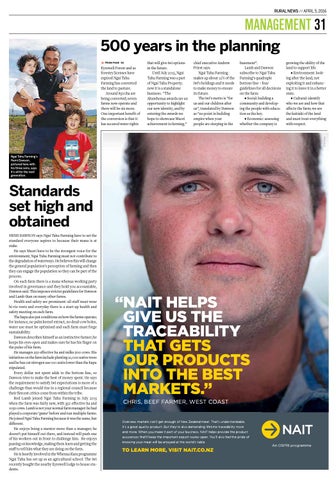RURAL NEWS // APRIL 5, 2016
MANAGEMENT 31 500 years in the planning FROM PAGE 30
Eyrewell Forest and as forestry licenses have expired Ngai Tahu Farming has converted the land to pasture. Around 8500ha are being converted; seven farms now operate and there will be six more. One important benefit of the conversion is that it has secured water rights
that will give iwi options in the future. Until July 2015, Ngai Tahu Farming was a part of Ngai Tahu Property; now it is a standalone business. “The Ahuwhenua awards are an opportunity to highlight our new identity, and by entering the awards we hope to showcase Maori achievement in farming,”
chief executive Andrew Priest says. Ngai Tahu Farming makes up about 12% of the iwi’s holdings and it needs to make money to ensure its future. The iwi’s motto is “for us and our children after us”, translated by Dawson as “no point in building empire when your people are sleeping in the
basement”. Lamb and Dawson subscribe to Ngai Tahu Farming’s quadruple bottom-line – four guidelines for all decisions on the farm: • Social: building a community and developing the people with education as the key. • Economic: assessing whether the company is
growing the ability of the land to support life. • Environment: looking after the land, not exploiting it and enhancing it to leave it in a better state. • Cultural: identify who we are and how that affects the farm; we are the kaitiaki of the land and must treat everything with respect.
Ngai Tahu Farming’s Hemi Dawson, pictured here with his three sons, says it’s all for the next generation.
Standards set high and obtained HEMI DAWSON says Ngai Tahu Farming have to set the standard everyone aspires to because their mana is at stake. He says Maori have to be the strongest voice for the environment; Ngai Tahu Farming must not contribute to the degradation of waterways. He believes this will change the general population’s perception of farming and then they can engage the population so they can be part of the process. On each farm there is a mana whenua working party involved in governance and they hold you accountable, Dawson said. This imposes stricter guidelines for Dawson and Lamb than on many other farms. Health and safety are prominent: all staff must wear hi-vis vests and everyday there is a start-up health and safety meeting on each farm. The hapu also put conditions on how the farms operate; for instance, no palm kernel extract, no dead-cow holes, water use must be optimised and each farm must forge sustainability. Dawson describes himself as an instinctive farmer; he keeps his eyes open and makes sure he has his finger on the pulse of his farm. He manages 250 effective ha and milks 900 cows. His initiatives on the farm include planting 21,000 native trees and he has cut nitrogen use 100 units lower than the hapu stipulated. Every dollar not spent adds to the bottom line, so Dawson tries to make the best of money spent. He says the requirement to satisfy iwi expectations is more of a challenge than would rise in a regional council because their fiercest critics come from within the tribe. Rod Lamb joined Ngai Tahu Farming in July 2015 when the farm was fairly new, with 350 effective ha and 1050 cows. Lamb is not your normal farm manager: he had played a corporate ‘game’ before and run multiple farms. He joined Ngai Tahu Farming because it was the same, but different. He enjoys being a mentor more than a manager; he doesn’t put himself out there, and instead will push one of his workers out in front to challenge him. He enjoys passing on knowledge, making them learn and getting the staff to tell him what they are doing on the farm. He is heavily involved in the Whenua Kura programme Ngai Tahu has set up as an agricultural school. The iwi recently bought the nearby Eyrewell lodge to house students. 0025 OPS Disease_Chris-Beef (280x187)_FAmm.indd 1
30/09/15 2:27 pm
